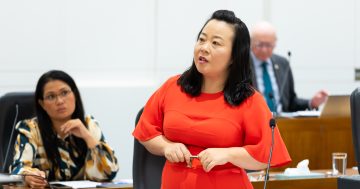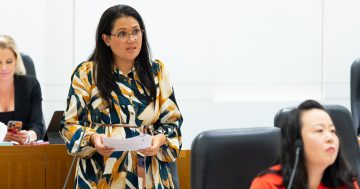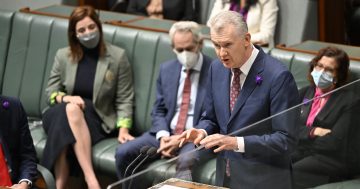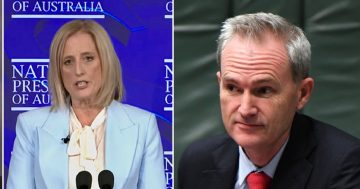
John Hewson writes some pretty good and incisive stuff on politics from time to time and his latest in the Crimes is one of those.
He points to the fact that most ministers in federal parliament are not qualified to hold their portfolios. Apart from George Brandis QC, who is the Attorney General, I can’t think of any minister who has experience, qualifications or training in his or her portfolio. Possibly Malcolm Turnbull as Chairman of the Political Board may qualify.
Mr Hewson points to something John Howard told him about regarding politics as a profession and politicians as professionals. Sadly, it is becoming more so and no more glaring an example can be found in our own Legislative Assembly.
Let’s have a look at the ministers and their shadows and see if there is any fit here. I’ll only look at the major portfolios because the minor ones are too numerous. OK, you have me… Gordon Ramsay is a qualified lawyer and did work in the corporate law sector prior to becoming a full-time clergyman.
Starting at the top, Andrew Barr has economics qualifications but didn’t use them until he became Treasurer. He worked in the political field or media monitoring. The Deputy Chief Minister, Yvette Berry was a union chief with United Voice. Her portfolios of Housing and Education really don’t relate to her pre-pollie experience. However, her work with women’s issues may be spot on.
Meegan Fitzharris worked as a public servant in the middle range and as a staffer for Mr Barr, hardly qualification for Health and municipal type services such as transport and rates, roads and rubbish. Mick Gentleman had no prior experience in environmental or planning matters but truth be said, he as a member of the protective services part of the AFP for a while and has some experience in the security game.
Back to Gordon Ramsay though, he is the Minister for seniors. Well, I’m the President of the Tuggeranong Seniors Club, the 55 Plus Club, and we have had no communication from his office at all. Obviously not taking this one that seriously! And what about the arts? I’ll bet he hasn’t been to the Tuggeranong Arts Centre yet. And it is owned by the ACT Government!
You have to say that Shane Rattenbury has some creds in climate change and sustainability but what about justice, corrections and mental health. His law qualifications were applied to work with Greenpeace so he has that one tick I guess. Rachel Stephen-Smith as minister for community services seems an ok fit because of her pre-pollie interest in this field but hey, what about disability, ATSI or multicultural affairs? What about industrial relations? These are tough portfolios and some experience or qualifications would be helpful.
Now for the Opposition. The leader, Mr Coe, was one of the youngest people elected to the Assembly and has no real experience in the workplace to spruik. But he’s the Treasurer and Economic Development minister in waiting. Doesn’t instill in me much confidence. His deputy, Nicole Lawder, worked in the community sector but how is this relevant to planning?
Steve Doszpot as shadow minister for urban services and seniors brings sports administration and media expertise to the table. Relevance? Former Speaker Vicki Dunne in her pre-pollie days was a professional political staffer. How this relates to the portfolio of health, I can’t work out.
Lt Col (Rtd) Jeremy Hanson as shadow attorney general is a good one because he is very structured in his approach to work and is methodical but not trained in the field. He was a logistics expert in the Army. His shadow portfolio of veterans’ affairs is appropriate but then again, it is a federal responsibility and not a local one. How Giulia Jones qualifies to carry the Police and Emergency Services and Corrections shadows mystifies me. No experience in these at all! A better fit would be Jeremy Hanson because at least he had the shadows before and would have learnt something about them.
Elizabeth Kikkert as shadow minister for families and for multicultural affairs is a good fit in that she has a large family of her own and has a Tongan ancestry. I have spoken to her on multicultural affairs and find that she is really committed to the job which is a good thing. Elizabeth Lee, a lawyer is shadow minister for disability and the environment. A missed opportunity as not only was she a lawyer, she was a lecturer in law as well. The Shadow A-G would have been a better fit.
James Milligan, or Spike as he is affectionately known, is a cricket tragic and so I suppose the sport shadow might be appropriate but he has indigenous affairs as well. Whilst the indigenous affairs portfolio is an important area neither of these are very taxing. Another talent wasted. Mark Parton is a media personality and owns a part share in two racehorses. I guess these qualify as him having previous experience relevant to the racing and gaming shadows. Really? But his major shadow of housing is an oddity.
Andrew Wall has the shadows of local business and industrial relations. A conflict of interest could exist here. I would have thought the current furore of penalty rate reductions has pitted small business against the workforce and one has to take a stand, like that of Kate Carnell, so I reckon he’ll back the penalty reductions and side with business. He did have some experience in small business before becoming an MLA but then Brendan Smyth worked in his father’s newspaper shop and in the National Gallery shop, thus qualifying him to make policy relating to small business. But where Mr Wall’s experience in education policy comes from, I’m not aware.
Carolyn Le Couteur, as the sole Green cross bencher, has a wide ranging brief and we’ll see her speaking on anything and everything, under wet cement if necessary. But she does have environmental creds and was a real force behind ethical investment of funds. She was, and may still be, for all I know, a director and major shareholder in Australian Ethical Investments which specializes in investing funds in enterprises which do not damage people’s health or the environment.
Hewson suggests that perhaps we could look at the US system where portfolios are recruited outside the political system. Well, we have the Westminster system and I can’t see that happening.
Although, it must be said that we have a system here that enables us to recruit expertise and qualification to the Direct-General jobs. This is where most of the policy thinking comes from and the pollies just give a general direction and off they go.
For the record, I had a number of shadow and real portfolios when I was in that august place and my qualifications were not relevant to any of them. My 30 years in public service, most in health administration did not lead me to the Health portfolio. I was a well-meaning amateur.
So, I guess, we just have to know that we are governed by a bunch of well-meaning amateurs who do their best. And if it not good enough for us, we whinge, criticize and toss them out. Good system eh?





















